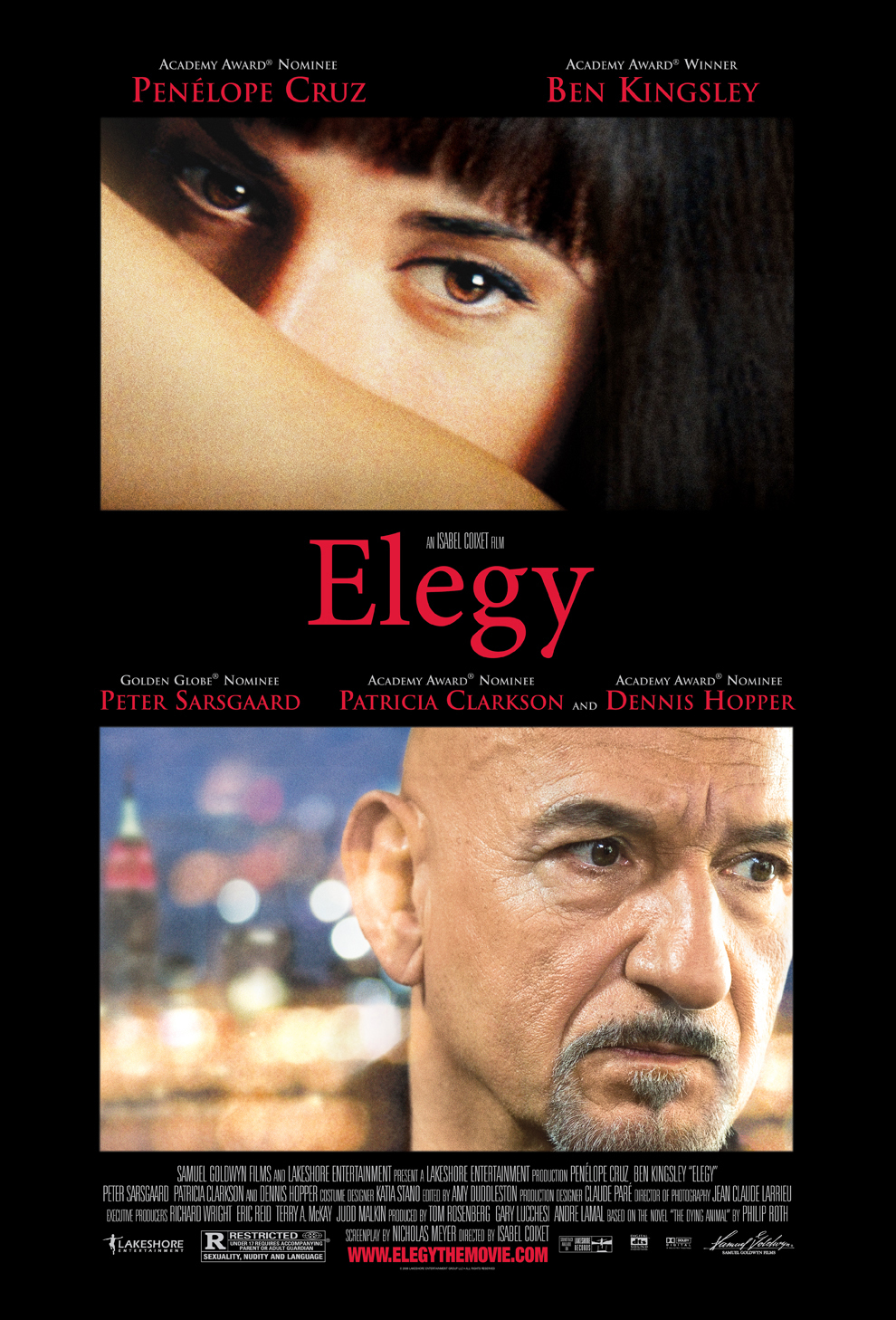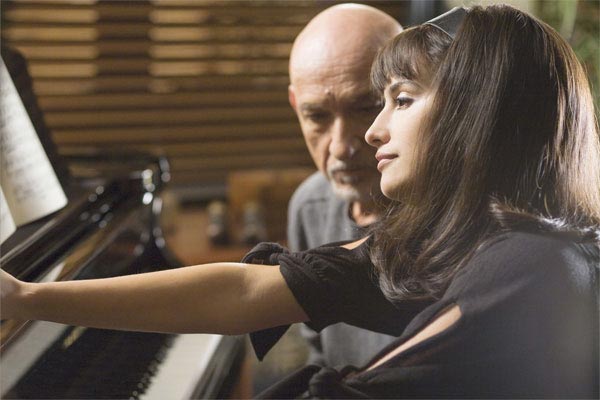

Director: Isabel Coixet, 2008. (R)
The title points to a sad and mournful musical or poetic composition. But who is mourning what?
Elegy is an under-rated movie by the director of The Secret Life of Words, from the novella by the Pulitzer-Prize winning author Philip Roth. As in that earlier film, Coixet focuses on relationships and explores the complexity of love and beauty, the conflicts brought on by freedom vs commitment, and the issue of growing old. Is it a melodrama? Not really, though the ending is contrived and overly sentimental. Is it erotic? In places, especially given the long panned views of Penelope Cruz's nude body. Is it cynical? Sometimes, considering the main character David Kepesh (Ben Kingsley) is a middle-aged womanizer who sees women as objects for his own personal pleasure. More than all these, Elegy is a beautiful and touching story of love won and lost and the power of love to transform.
Kepesh is an intellectual. A professor of literature in New York City, he is single and on the prowl. The opening scene shows him in a TV studio discussing one of his books on hedonism in the early American settlements. He reads a quote about this, " 'Debauched Bakunin aliens and atheists, falling into great licentiousness, and leading degenerate lives.' When I heard that, I packed my bags, I left Oxford, and I came straight to America, America the licentiousness." Coixet uses this scene to introduce Kepesh' character: a Brit who left his strait-laced and stiff-upper-lip birth-country for the sexual freedom of the liberated States.
 Consuella (Penelope Cruz) walks into one of his classes and straight into his heart. Unlike any of the other myriad of women he has conquered and discarded, she stands out as classy, sophisticated, elegant and educated, a woman to be wooed. She has beauty that reminds Kepesh of beautiful art, momentary yet eternal. She is also 30 years younger than him and reminds of his lost youth. The wasted years.
Consuella (Penelope Cruz) walks into one of his classes and straight into his heart. Unlike any of the other myriad of women he has conquered and discarded, she stands out as classy, sophisticated, elegant and educated, a woman to be wooed. She has beauty that reminds Kepesh of beautiful art, momentary yet eternal. She is also 30 years younger than him and reminds of his lost youth. The wasted years.David is growing old but he has never grown up. Despite an early marriage which produced a son, Kenny (Peter Sarsgaard), he has moved on from this divorce. He cannot hold down a relationship, because he does not share himself. He preys on his students for sex and sex alone. The cycles of life, though, demand a maturation. We are supposed to grow up as we grow old. That is not to say we should give up our passions and dreams. But with grey hair should come wisdom and a perspective to life.
We should not remain an emotional teen in a 50-year-old body. Many do, and we witness this in the mid-life crises that hit some men who realize their best years are behind them. Throwing off the wife of their youth, they trade-in their tan Taurus for a red Mustang. And they trade-up to a new young bride, who will make them feel young again . . . at least for a few years until the prostate goes.
David says it himself, "I think it was Betty Davis who said old age is not for sissies. But it was Tolstoy who said the biggest surprise in a man's life is old age. Old age sneaks up on you, and the next thing you know you're asking yourself, I'm asking myself, why can't an old man act his real age? How is it possible for me to still be involved in the carnal aspects of the human comedy? Because, in my head, nothing has changed." He does not want to act his real age, for fear of his own mortality.
 Fear of commitment is another factor in his psyche. He has no long-standing relationships except one male friend George (Dennis Hopper) and one female friend Carolyn (Patricia Clarkson). The contrast between relationship and sex is brought out clearly in these two foils. George is "happily" married but maintains a string of mistresses, just for sex. He separates the two. His wife is a friend; his younger mistress is a sex-kitten. Somehow he is able to compartmentalize these two fundamental aspects of life. Carolyn, on the other hand, is a former student who has maintained a sexual relationship with David for 20 years. Coming into his life for brief one-night stands as she flies into New York, theirs is a relationship of convenience. In one scene, she asks him, "Is this our first real conversation?"
Fear of commitment is another factor in his psyche. He has no long-standing relationships except one male friend George (Dennis Hopper) and one female friend Carolyn (Patricia Clarkson). The contrast between relationship and sex is brought out clearly in these two foils. George is "happily" married but maintains a string of mistresses, just for sex. He separates the two. His wife is a friend; his younger mistress is a sex-kitten. Somehow he is able to compartmentalize these two fundamental aspects of life. Carolyn, on the other hand, is a former student who has maintained a sexual relationship with David for 20 years. Coming into his life for brief one-night stands as she flies into New York, theirs is a relationship of convenience. In one scene, she asks him, "Is this our first real conversation?" Relationship is fundamental to humanity. We were created to connect to others (Gen. 2:24). We connect as we open up and share who we are. We cannot have a genuine relationship if we do not disclose our identity. If we take no risk, we build no relationship. One demands the other. We were also created as sexual beings (Gen. 1:28), to enjoy sex (Song of Solomon 4:16. But this was and still is intended to be enjoyed within the boundaries of marriage (Heb. 13:4). One man-one woman, connected to one another in holy matrimony (Matt. 19:6). This provides the freedom to truly enjoy one another without the fear of jealousy and loss. David did not understand this. He sees marriage as a prison and freedom only in uncommitted sexual exploration. He has got his perspectives twisted.
 When he falls in love with Consuella he is forced to come face-to-face both with his age and his worldview. No longer can he use her and betray her. She is better than this. For the first time in his life he is insecure. He faces his own fear: fear of losing her. He believes it cannot last; the age gap is too great. Having given his heart, he fears it will be broken. And in this fear, he does what we often do: he sabotages this relationship.
When he falls in love with Consuella he is forced to come face-to-face both with his age and his worldview. No longer can he use her and betray her. She is better than this. For the first time in his life he is insecure. He faces his own fear: fear of losing her. He believes it cannot last; the age gap is too great. Having given his heart, he fears it will be broken. And in this fear, he does what we often do: he sabotages this relationship.Fear, love and sabotage. Too often, we break things off prematurely, rationalizing that it is better to cut it off early and experience some pain, than to let a relationship develop and lose it later when that pain would be infinitely worse. This is hogwash. It is fallacious logic. We don't know what the future will bring. That is why life is how it is -- a grand adventure. Love does involve fear at times. If we open ourself up to another, we are at risk of abandonment. But that is a risk we must face. As the apostle John tells us, "perfect love drives out fear" (1 Jn. 4:18).
Coixet coaxes stellar performances out of her cast. Kingsley and Cruz are tremendous actors, both having received Oscar nominations (Kingsley won for Ghandi, Cruz lost for Volver). So this is no surprise. Sarsgaard is strong in his few scenes, as a bitter son following in the footsteps of his father, finally seeking counsel from a man who has no wisdom to offer. But most surprising of all is Dennis Hopper. Playing against type (normally an over-the-top villain, as in Speed), he gives one of his best performances in one of his last roles (sadly passing away just two months ago).
Hopper it is who introduces one of the best themes of this film: beauty. In one of the coffee-shop meetings with David, George the poet posits a thesis: "Beautiful women are invisible." Provocative. David replies, "Invisible? What the hell does that mean? Invisible? They jump out at you. A beautiful woman, she stands out. She stands apart. You can't miss her." We would all agree with this. When we see a beauty, like Penelope Cruz, we know it. We can't miss it. But that's not George's point: "But we never actually see the person. We see the beautiful shell. We're blocked by the beauty barrier. Yeah, we're so dazzled by the outside that we never make it inside."
 David is a connoisseur and a sophisticate. As a photographer and pianist, he knows art. He recognizes beauty.He can see the outward picture of beauty but what does he know of the inner beauty? Nothing. Until he meets Consuela.
David is a connoisseur and a sophisticate. As a photographer and pianist, he knows art. He recognizes beauty.He can see the outward picture of beauty but what does he know of the inner beauty? Nothing. Until he meets Consuela.Beautiful women are often objectivized. They are seen for their outward beauty not for their character or personality. They become sex objects. Hollywood is guilty of this. But how often do we look at a beautiful woman and fail to see the real person? Beauty (for a woman) or handsomeness (for a man) can sometimes be a barrier to connection. What draws people to gaze or ogle also separates, leaving them imprisoned inside a glass case which is not of their own making. And the truth is, such beauty is only skin-deep, and will fade with time as wrinkles appear and curves disappear. We must look beyond superficial beauty to the real person. That is the only way to see true beauty and experience true relationships.
So, whose elegy is it? It seems to be Kepesh's elegy, for his lost relationships, his lost possibilities, as time relentlessly marches on. Do we need a wake-up call like his? Or are we secure in our age and our relationships?
Copyright ©2010, Martin Baggs


No comments:
Post a Comment